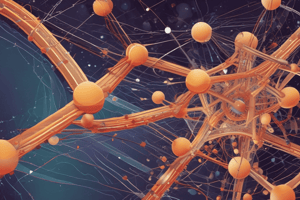Podcast
Questions and Answers
What is the definition of a solvent?
What is the definition of a solvent?
- Substance that is dissolved in a solution
- Matter with no definite shape but with a definite volume
- Substance that does the dissolving in a solution (correct)
- Substance made up of molecules that contain more than one kind of atom
What is a physical change?
What is a physical change?
When substances change phases of matter by adding or taking away energy
What is a solid?
What is a solid?
Phase in which matter has a definite shape and volume
What is a gas?
What is a gas?
What is a chemical change?
What is a chemical change?
What is a mixture?
What is a mixture?
What is a solute?
What is a solute?
What is a compound?
What is a compound?
What is an acid?
What is an acid?
What does pH measure?
What does pH measure?
What is volume?
What is volume?
What is the boiling point?
What is the boiling point?
What is mass?
What is mass?
What is density?
What is density?
What is evaporation?
What is evaporation?
What is condensation?
What is condensation?
What is heterogeneous?
What is heterogeneous?
What is a physical property?
What is a physical property?
What is a phase?
What is a phase?
What is a liquid?
What is a liquid?
What is a chemical property?
What is a chemical property?
What is a chemical reaction?
What is a chemical reaction?
What is a solution?
What is a solution?
What is an element?
What is an element?
What is a base?
What is a base?
What is an indicator?
What is an indicator?
What is the melting point?
What is the melting point?
What is the freezing point?
What is the freezing point?
What is weight?
What is weight?
What is vaporization?
What is vaporization?
What is sublimation?
What is sublimation?
What is homogeneous?
What is homogeneous?
What is salt?
What is salt?
Flashcards are hidden until you start studying
Study Notes
Solutions and Mixtures
- A solvent is the substance that dissolves a solute in a solution.
- A solute is the substance that is dissolved in a solution, forming a homogeneous mixture.
- A mixture consists of two or more substances physically combined but not chemically bonded, including heterogeneous and homogeneous types.
States of Matter
- Solid: Matter with a definite shape and volume.
- Liquid: Matter that has a definite volume but no definite shape.
- Gas: Matter with neither a definite shape nor volume.
- Phase refers to the state in which matter exists: solid, liquid, gas, or plasma.
Changes in Matter
- Physical change involves a change in phase or appearance without altering the substance's identity, often due to energy changes.
- Chemical change transforms a substance into a new one, altering its chemical structure.
- Evaporation is the surface vaporization of a liquid, while condensation is the process of a gas turning into a liquid.
- Sublimation occurs when a solid changes directly into a gas without becoming a liquid first.
- Phase transitions are indicated by specific temperatures:
- Melting point: solid to liquid.
- Freezing point: liquid to solid.
- Boiling point: liquid to gas.
Properties of Matter
- Physical properties can be observed without changing a substance's identity, assisting in distinguishing different types of matter.
- Chemical properties describe how a substance behaves in reactions and how it forms new substances.
- Density measures mass per unit volume, indicating how compact a substance is.
Acid-Base Chemistry
- Acids are compounds that typically contain loosely bonded hydrogen ions and can donate protons in reactions.
- Bases contain oxygen and hydrogen, often accepting protons in reactions.
- pH is a scale used to quantify acidity or basicity, determining how strong or weak an acid or base is.
- An indicator is a substance that changes color in response to acids or bases, helping to visually determine pH levels.
Fundamental Concepts
- Element: The simplest form of pure substance consisting of only one type of atom.
- Compound: A substance formed when two or more different kinds of atoms chemically combine.
- Weight measures the gravitational force on an object, while mass denotes the amount of matter in that object.
- Volume is defined as the space an object occupies.
Unique Mixture Definitions
- Heterogeneous mixtures have visibly different substances or phases, while homogeneous mixtures have a consistent composition throughout.
Studying That Suits You
Use AI to generate personalized quizzes and flashcards to suit your learning preferences.




